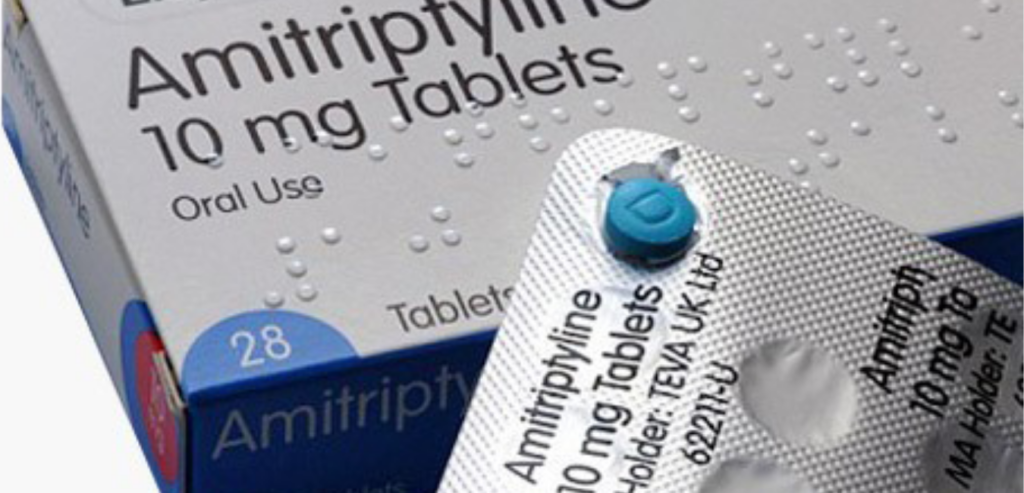Amitriptyline, Side effects, Clinical Indications Uses & Warnings
Amitriptyline belongs to the drug class known as tricyclic antidepressants. These drugs are primarily used for treating depression.
Amitriptyline Is a prescription drug, meaning you won’t be able to acquire this medication without having a prescription first. This is because the long-term use of these medications can lead to physical dependence on these drugs.

Initially, these drugs were developed to treat anxiety and depression, but later, it was discovered that small doses of these drugs could also help reduce pain.
These drugs mainly work by increasing the concentrations of serotonin in the CNS. Serotonin is one of the key hormones involved in mood stabilization, feeling of happiness, and well-being. Serotonin can also help with eating and sleeping.
Amitriptyline can be used to treat conditions such as major depressive disorders, management of neuropathic pain, and the prophylactic treatment of migraine.
Some of the common side effects of these drugs include drowsiness, dizziness, constipation, weight gain, etc.
In this article, we will discuss what these medications are? Why do we use this drug? What is the mechanism of action? And also, what are the common side effects of this drug.
Generic name of Amitriptyline :
- Amitriptyline
Common brand name:
Some of the common brand names of amitriptyline include:
- Enavil
- Endep
- Vanatrip
Drug class:
Amitriptyline belongs to the drug class known as tricyclic antidepressants (TCAs)
Mechanism of action:
The mechanism of action of these drugs is not clearly understood. Some studies suggest that this drug performs its action by inhibiting the membrane pumps that are responsible for the reuptake of chemicals such as serotonin, norepinephrine, and transmitter amines.
An increase in the concentrations of these drugs in the CNS helps elevate mood and reduce depression.It is postulated that decreased concentrations of the chemicals such as serotonin and norepinephrine in the brain are responsible for depression.
So by increasing the concentrations of these chemicals in the brain, it helps counter depression.
The mechanism of analgesic effects of these drugs is not fully understood.
Clinical indication:
Amitriptyline is indicated for the following conditions:
- Major depressive disorders
- Prophylactic treatment of migraine
- Management of neuropathic pain
- chronic tension-type headache
Some of the off label use of these drugs include:
- Anorexia nervosa
- ADHD
- Diabetic neuropathies
- Irritable bowel syndrome
- Sleep disorders
- Agitation
- Anxiety
Before taking Amitriptyline :
To make sure that the medication is safe for you, make sure that your doctor knows about the following medical conditions:
- Bipolar disorders
- Heart problems
- Hypertension
- Liver disease
- Kidney disease
- Long QT syndrome
- Seizures
- Bleeding problems
- Glaucoma
Some people have suicidal thoughts after using this medicine, so in that case, make sure that you visit your physicians regularly and inform your doctor about your current condition.
Dosage:
Formulations:
Amitriptyline is available in the following formulations:
- Oral tablets
- Oral solutions
Side effects:
Some of the common side effects of amitriptyline include:
- Agitation
- Agranulocytosis
- Alopecia
- Anxiety
- Anorexia
- Ataxia
- Arrhythmia
- Urticaria
- Vomiting
- Xerostomia
- Weakness
- Weight gain
- Blurred vision
- Coma
- Confusion
- Constipation
- Diarrhoea
- Dizziness
- Dry mouth
- ECG changes
- Eosinophilia
- Stomatitis
- Syncope
- Sweating
- Tachycardia
- Thrombocytopenia
- Tinnitus
- Palpitation
- Paresthesia
- Photosensitivity
- Rash
- Restlessness
- Sedation
- Seizure
- Sexual dysfunction
- SIADH
- Stroke
- Extrapyramidal symptoms (EPS)
- Fatigue
- Hallucination
- Headache
- Hypertension
- Increased LFTs
- Insomnia
- Lethargy
- Leukopenia
- MI
- Nausea
- Ocular pressure increased
- Orthostatic hypotension
Call your doctor immediately if you are experiencing any of the below symptoms:
- Allergic reactions such as skin rash or hive
- Difficulty breathing
- Swelling of the face, lips, tongue, To and throat
- Behavioral changes( worsening of anxiety, depression, feeling impulsive, irritable, hostile, hyperactive, restless, and having thoughts about hurting yourself or the others)
- Seizures
- Manic episodes
- Visual disturbances ( eye pain, redness, or swelling )
- Headache
- Confusion
- Memory loss
Contraindication of Amitriptyline :
Amitriptyline is contraindicated in the following situations:
- If you are taking Monoamine oxidase inhibitors (MAOI) such as methylene blue or linezolid, do not use this medication.
- If you have used MAOI in the last two weeks, do not use this medicine.
- If you have used amitriptyline in the last two weeks, do not use MAOI.
- Do not use pimozide while using amitriptyline because the coadministration of these two drugs can increase the risk of developing heart diseases.
- Do not use the liquid formulation of amitriptyline if you are using disulfiram to avoid any complications.
- Do not use this drug if you are allergic to amitryptiline or any other inactive ingredient of this drug.
- The medicine is known to cause hyponatremia with characteristic SIADH among elderly patients who are using diuretics. Avoid this drug if you are experiencing electrolyte imbalance.
Precautions of Amitriptyline:
The medicine can be taken with or without food, as per the direction of your doctor. If you are self-medicating yourself with this drug, make sure you thoroughly read all the instructions given on the product leaflet.
If you're taking this medicine in liquid form, measure the dose carefully with a special measuring spoon usually provided with the medicine. Do not measure your dose with household items such as spoons etc., because you might not get the correct dosage.
You have to remember that the dosage of any drug may differ based on age, condition, and a patient’s response to therapy. Make sure you do not take this medicine above the recommended dose. In case your doctor prescribed this drug to you, follow his directions.
Before starting any medication, keep the following points in mind:
- Before starting any medication, tell your pharmacist about your drug allergies (if any) because sometimes a drug contains inactive ingredients along with the salts that may flare up your allergies.
- You should let your physician know about any of your other medical conditions such as liver disease, renal disease, etc.
- Always make sure that you read the medication guide carefully. When in doubt about any medication, it is best to consult your pharmacist or your physician.
- Let your physician know if you are pregnant or planning on becoming pregnant during the course of therapy.
- You should take your medications at the proper time and not try to alter the dosage yourself.
- To get the most benefit from your medications, you must take them on time.
- If you are taking any other medications, vitamins, or herbal products along with. In that case, it is best to let your pharmacist or your doctor know about that medication so that any adverse effects due to drug interaction can be avoided.
- Tell your doctor if your condition persists or worsens over time.
Special instructions of Amitriptyline:
- Pregnancy: These drugs are not recommended during pregnancy because of their negative effects on the fetus. Consult your doctor as there might be some alternative to these drugs that are safe in pregnancy.
- Nursing mothers: These drugs are not safe to use in nursing mothers as studies have shown that these drugs get excreted in breast milk and can cause serious side effects in your baby.
Drug interaction:
It is impossible to list all the drug interactions in this article. Some of the important ones are defined in this article. The best practice is to list all your medication and then check with your pharmacist about any possible drug interactions that can occur with the medication you are prescribed.
- Monoamine Oxidase Inhibitors (MAOIs): The concomitant use of SSRI and amitriptyline can increase the risk of serotonin syndrome.
- Pimozide: Co-administration of Amitryptiline and pimozide can increase the risk of ventricular arrhythmias and prolonged QT syndrome.
- Other Serotonergic Drugs: Interaction between amitriptyline and other serotonergic drugs can increase the risk of serotonin syndrome.
- Antiplatelet agents and anticoagulants: Co-administration of anticoagulants or antiplatelet drugs with amitryptiline can increase the risk of bleeding disorders.
Some of the other drugs that can interact with amitriptyline include:
- Phenytoin
- Drugs Metabolized by CYP2D6
- Drugs that Prolong the QTc Interval
- Drugs Highly Bound to Plasma Protein
Overdose of Amitriptyline:
Overdose may be accidental or purposeful. You should keep in mind that if you miss a dose, do not try to compensate by taking the extra dose when the next dose is due. You can consult your physician or your pharmacist about the doses you missed.
Some of the common symptoms of poisoning of Amitriptyline include:
- somnolence
- Vomiting
- Tachycardia
- Nausea
- Dizziness
- Agitation
- Tremor
Storage of Amitriptyline:
Following steps must be taken to store medicine properly:
- Keep your medications in the same container they came in.
- Store your medicine at room temperature
- Keep your medication away from the direct sunlight.
- Keep your medicine away from moisture and excess heat e,g, bathroom or kitchen.
- If you have children, keep medications out of their reach to avoid any accidental poisoning, always lock safety caps and immediately place the medications in a safe location.
- Drugs should be dispensed appropriately so any accidental poisoning that may result as a result of consuming expired drugs can be avoided.



